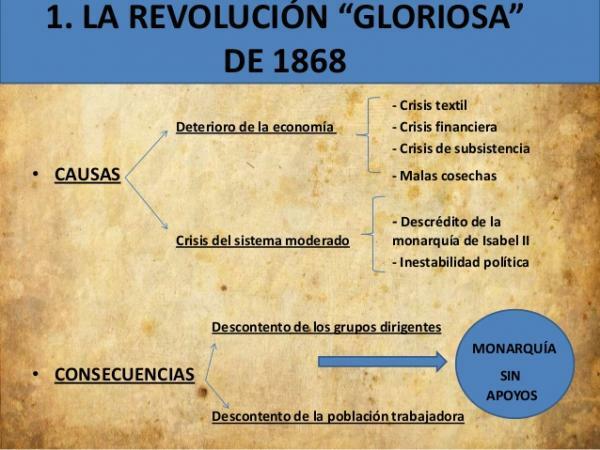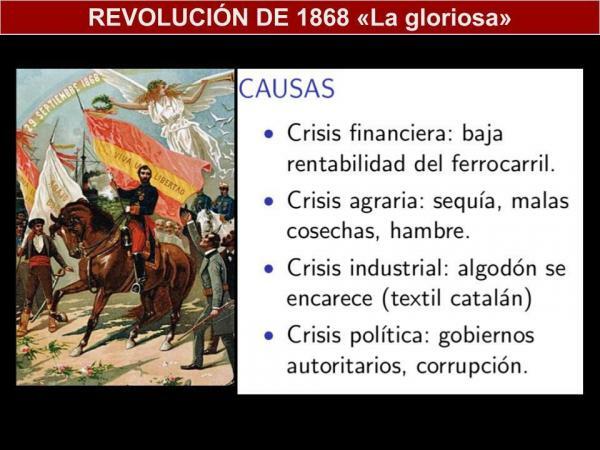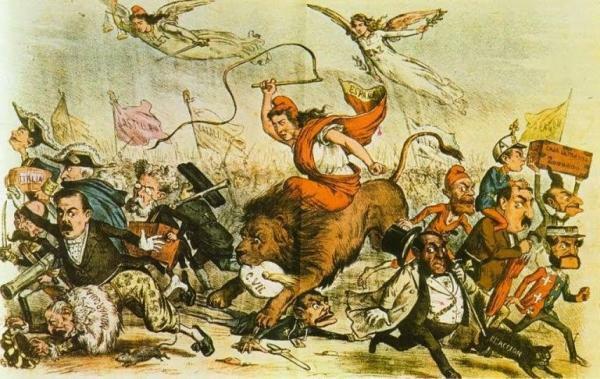La Gloriosa: causes and consequences

Image: Slideshare
Within the series of events that occurred throughout the Spanish 19th centuryThere is a very important period that produced great instability within the entire political and social sphere. In this lesson from a TEACHER we will talk about the causes and consequences of the Glorious, one of the best known revolutions in our country. This uprising ended the parliamentary monarchy of Isabel II of Castile, giving way to the I Spanish Republic.
Index
- Spain at the end of the reign of Isabel II
- The causes of La Gloriosa
- The Ostend Pact and the Revolution
- Aftermath of the Glorious
Spain at the end of the reign of Isabel II.
Before starting to talk about the causes and consequences of the Gloriosa, we will focus on knowing the historical background that led the country to wish the end of said system. In the year 1860, Spain was in a great economic crisis due to the conservative system that the Government had been dragging on since 1844. Well, except on rare occasions, there was a progressive government, which barely lasted long enough in power to improve the country.
It is known that since the 1960s a series of military uprisings against the monarchy but that, finally, they were restrained. In many cases there were death sentences for insurgents, as was the case in 1866 when 66 people were shot.
The causes of La Gloriosa.
In the 1960s in Spain a huge financial crisis which came preceded by the Catalan textile crisis. This caused the Spanish railway networks to go bankrupt, dragging the banks and other credit companies with it.
To this, a series of bad crops, like those of the years 1867-68, which resulted in not even having bread for classes popular, being this therefore a crop for the riots that were happening throughout the geography.
Similarly, and within the financial and social crisis, many people were unemployed, as companies and industries could not pay staff members. That is, we can say that Spain was almost paralyzed.

Image: Geography and History
The Ostend Pact and the Revolution.
We continue our lesson on the causes and consequences of the Gloriosa, now we will locate ourselves in the city of Ostend (Belgium) where a meeting was held between the Spanish democrats and progressives on August 16, 1866. In this pact, the intention of overthrow the monarchy of Elizabeth II, to establish a provisional Government and that was the one that decided the future of Spain.
In this way, the statement was sent to Spain so that the supporters of the idea would know the plan. Thus, for the month of September 1868, there was already a plan to begin the military uprising, which was to begin in the city of Cádiz.
Thus, the September 18, 1868 the uprising began, Admiral Topete being the one who read the manifesto and by the 20th it had already expanded throughout much of Andalusia, creating the first Government Junta in Seville. Given this, the Government formed an army as it could, since most of the military commanders were related to the revolution and with it most of the country's soldiers.
On September 28, the battle of Alcolea took place, where General Serrano won a great victory. In addition, on the 29th there was an uprising in Madrid and the Queen had to leave Spain on the 30th, without giving up rights. From that moment, the new provisional government began to be forged, which was fully operational on October 8.
Consequences of the Glorious.
To conclude our lesson, we will now talk about the consequences of La Gloriosa. Between the years 1868-1874, Spain was ruled by progressive governments, a period that was known as the democratic administration. In these governments, the coalition between the moderates, liberals and republicans was essential to find a head of state to end the Spanish problem.
While the perfect candidate or the perfect form of government was found, General Serrano was appointed regent, under his mandate the Constitution of 1869.
It was soon decided, with the exception of the republican side, to look for a new monarch within the European houses. In this way, they searched all over Europe, without finding anyone (from this period we can find endless satirical cartoons).
In the end, and after a long search, Prim managed to Amadeo of Savoy he accepted the title of King of Spain, although his reign would only last two years and a month (1871-1873), giving way to the I Spanish Republic.

If you want to read more articles similar to La Gloriosa: causes and consequences, we recommend that you enter our category of Story.



